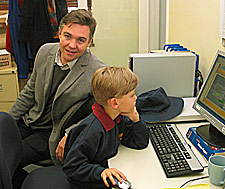
Moore College lecturer, Michael Jensen, and his young family are now on their way to spend three years at Oxford University, but new technology means they are staying only a keystroke away from friends and family.
Michael already has his blog - [url=http://www.mpjensen.blogspot.com]http://www.mpjensen.blogspot.com[/url] " up and running and is encouraging Sydney Anglicans to keep posting comments.
"We have rich communication possibilities these days," says Michael.
"It not a substitute for real presence, but you can certainly build and maintain community really effectively over long distances because the internet never sleeps."
Michael, who will be studying for a doctorate in theology, says he hopes the blog will keep him accountable to his financial supporters in Sydney.
"I'll be posting my theology papers but also my general musings," he says.
"I strongly believe that learning is collaborative, and I am conscious that I am being sent by the Sydney Anglican community, so I want people to share in the experience and the ideas. I am hopeful that people will see things that I can't see."
Michael's thesis topic "What is humanity?' comes out of his previous experience as Chaplain to St Andrew's Cathedral School.
"I remember going into a class to talk about suicide," he says.
"The students saw suicide as a viable choice for them because they believe so strongly in individual choice. It is hard to crack that base level individualism.
“They are always told by their culture to look inside themselves to find out who they are, and that can be a terrible experience for teenagers who don't like what they see."
"What is a human being? Who is man?' the Christian answer to this question is distinctly different to a secular answer and is the root cause of the tensions Christians experience with the secular world."
Michael wants to explore how these questions are answered by Jesus - the "paradigm' human being.
"I hope my work will involve engaging secular thinkers and will become a well-spring of thinking amongst Sydney Anglicans about how best to engage our culture. It's not just in-house mumblings, it must be subjected to the discipline of speaking to non-believers."
Michael is excited to be writing his thesis " word length of "about one hundred thousand ' - under the watchful eye of world-reknown English theologian Professor Oliver O'Donovan, author of Resurrection and Moral Order and The Desire of the Nations.
"His work is vitally important for evangelicals," says Michael.
"Oliver O'Donovan brings the whole of the Bible to bear on matters of theology and ethics. He inspired me to think through how Christianity impacts politics, and the depth of his reading of secular and Christian thinkers is a model for me."
But Professor O'Donovan will be no easy task-master, he has already asked Michael Jensen to learn German from scratch.
"A pre-requisite for being accepted to my theology doctorate was learning German," he says.
"A lot of the key thinkers I am looking at are German-speaking."
But the knowledge that Sydney Anglicans are praying for him and his family will be very important, says Michael.
"As a scholar, you need to be spiritually protected because you have to go to places that are very hard to go to. You are forced to face all the tough questions about the faith."
Michael also asks for prayer for his wife, Catherine, sons Simon, 7, Sacha, 2, and daughter Matilda, aged 7 months.
"It's my kids’ first trip overseas," he says.
"We also need prayer that we will settle into a good church home, and that our time in the UK will be happy and not an isolating experience as a family."



























